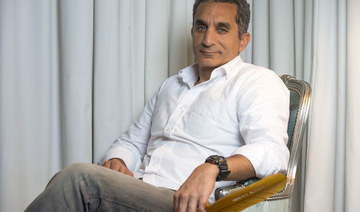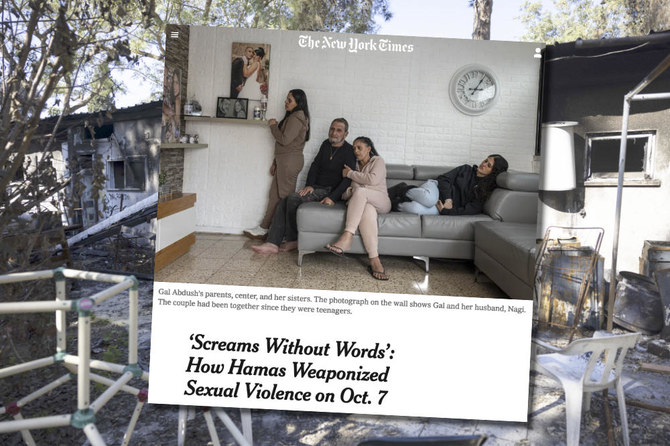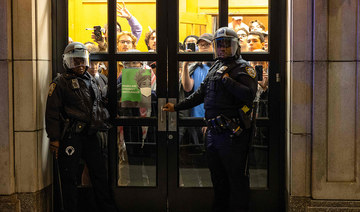DUBAI: Media launches are exciting and demanding events, but launching an entirely new multi-platform channel in the Middle East is a task of a different order of magnitude.
Nabeel Alkhatib soon will turn on the switch to start broadcasting Asharq News on television, the internet and across a variety of social media platforms in Arabic.
This ambitious project — an exclusive content agreement between the international information giant Bloomberg and the Saudi Research and Marketing Group, which also owns Arab News and the world’s biggest Arabic news outlet, London-based Asharq Al-Awsat, as well as several other titles in the Kingdom — has been some time in the planning.
Alkhatib, general manager of the new operation, sees a distinct need for the imminent channel, despite the fact that there are already 18 Arabic TV stations broadcasting in the Gulf region. “There are certain target groups who are not being catered to terms of the proper content, or with content that is not suitable for them,” he told Arab News.
Although Alkhatib is talking about the targeting of content, what is “suitable” for readers and viewers is at the heart of the debate that has been going on at Asharq since the launch was announced three years ago.
Bloomberg is a big, brash global news organization with 2,700 journalists and experts around the world, known for their independence of thought and a tendency to often take a counter-cyclical view in its business-oriented coverage. That could sometimes offend viewers, readers and, not least, governments and policymakers in the region.
How will Alkhatib approach the issue if Bloomberg content goes beyond what is normally considered acceptable in the Middle East?
“We have a mechanism for that. Whatever we think is suitable for the region, we take it as is. If we see an article of potential interest to our viewers or readers, we translate it as it stands. If it’s not suitable or appropriate for whatever reason, we don’t take it. But we either take in full, or we don’t take it at all,” he said.
“What do we do if they (Bloomberg) publish something that is not suitable for us from an editorial perspective, or is politically sensitive, or maybe it contradicts the laws we abide by in the region? If so, we either take it as is or we don’t take it at all. We will not be modifying any of their content. We respect the integrity of their content,” he added.
On the crucial question of editorial decision-making, he is determined to abide by internationally accepted guidelines.
“Our editorial guidelines and directions in Asharq are that we try to publish anything that might be of real interest to our public appearing on Bloomberg as long as it is balanced, fair and accurate, and does not contradict any laws.
“Sometimes there might be a masterpiece, but a lawyer will say don’t run it because you will be under liability. But anything that is legally viable and is of real interest to our potential viewers or readers, we need to push for publishing,” he added.
Although these are standard editorial guidelines in many parts of the world, in the Middle East, he said, it amounted to “pushing the envelope.”
The new channel will be different from existing products in other ways, too, Alkhatib said, serving audiences that he believes are not well catered for at the moment.
“The first group is the main business leaders, entrepreneurs and political leaders who need to be aware of economic developments around the world, and how that might affect the Middle East and their respective countries.
“There is no such content in Arabic, believe it or not, because none of the players is giving priority to covering international markets, economic opportunities or challenges, and how they might affect the region,” he said.
The other target audience is the huge number of young Arabs overlooked by existing channels. A majority of the Arab-speaking population is under the age of 25.
*******
BIO
BORN: Palestine, 1962
EDUCATION: Undergraduate and doctoral qualifications from former Soviet Union
CAREER
Founder of journalism school at Birzeit University, Palestine
Lecturer at Jordan Media Institute and American University in Dubai
MBC News bureau chief, Jerusalem
Executive Editor, Al Arabiya
General Manager, Al Arabiya
General Manager, Asharq News
*******
“Everybody sees them, but nobody is catering for them. They are not being catered for by any mainstream media. We thought we should appeal to them and tackle their issues and concerns, and we will do that via lots of digital platforms, because this is the way they like to consume content,” he added.
After a life-long career in the senior echelons of regional journalism, Alkhatib believes a new approach is needed.
“We are not trying to be ‘TV-centric’ like the others. The others are stuck with TV. They have been there a long time and are stuck with workflows that cannot change very easily. We are new so have learned from the difficulties that others have been through, and we are trying to be ‘story-centric.’ That will help us become agile and more appealing,” he said.
By ‘story-centric’ he means a fresh way of looking at news coverage. “We do not concentrate on what suits TV, or what might suit a website. We think about the issue itself, the content, and we serve it with whatever it requires in terms of research and information. We always try to give a perspective of the event, and this is something that has rarely been done in Arabic-speaking news journalism,” he said.
“We try to give a 360-degree view on a story, ‘Connecting the Dots’ is the Asharq News slogan that drives its journalistic work and sets its ultimate goal. The dots at Asharq News connect the news to its context, geographical setting, historical dimension, political depth, economic impact and social reality.
This is something which has not been popular in the region,” he said, explaining that regional news coverage had relied too much on international news agencies for global coverage, without giving a regional context.
The other reason traditional regional media has come up short is, “in my very personal view”, political. “There are a lot of players in the region who are imprisoned by political polarization, and that limits the ability to tell a story the way it is. If you’re telling a story, you either try to be fair and balanced, or you try to cater for your own ideology,” Alkhatib said.
The flagship of the new venture will be a 24-hour news channel, with a strong business element largely provided by the Bloomberg content agreement. “There will be around 30 percent of business in the beginning, but there are no walls between business and non-business. The interesting thing is that we’ll be offering a morning show that is business led.
“For the first time in the region, and with all due respect, the two-hour morning show will not be catering for housewives, but for CEOs who like to know how North America closed last night, how the Asia markets are now working, and how this might affect our region, so they can have a panoramic view of what’s happening around the world,” he said.
The rest of the daily broadcasting schedule will consist of news, documentaries and investigative content. One segment, entitled “The Link,” will explain to viewers how political events are affecting business and economics, while another will explore the implications of global events for the Middle East. Another program, “East Circle,” will take a deep dive into areas such as politics, economics and technology.
The TV channel will be accompanied by a “very strong” digital operation, with content, including sports news, automatically tailored to individual users’ taste and interests.
“We don’t think people appreciate news organizations imposing on them what they think they will like,” he said. There will also be a video-on-demand platform for viewers to see Bloomberg and original content.
Alkhatib expects a big chunk of the coverage to be about Saudi Arabia, as the biggest economy in the region and a member of the G20 group of leading nations. But the operation will cover the whole of the Middle East and North Africa in depth, with offices in Riyadh, Dubai and Cairo, as well as a planned operation in Morocco.
Asharq News is headquartered in Riyadh, and with central offices in DIFC, Dubai, and in Washington D.C, But there is a big and expanding operation in Riyadh that Alkhatib believes will one day be the main operations base for a hub of satellite offices around the region and beyond.
“We are bringing Bloomberg content and a new approach, a new way of dealing with the other platforms. We would like to think we are offering viewers and readers something they will not see on other platforms in the region,” he said.




























